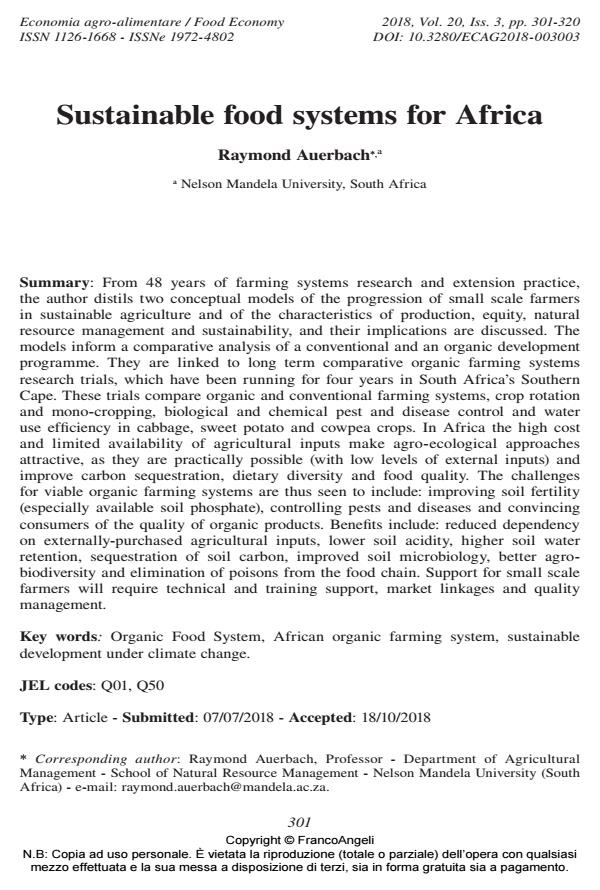Sustainable food systems for Africa
Titolo Rivista ECONOMIA AGRO-ALIMENTARE
Autori/Curatori Raymond Auerbach
Anno di pubblicazione 2019 Fascicolo 2018/3
Lingua Inglese Numero pagine 20 P. 301-320 Dimensione file 213 KB
DOI 10.3280/ECAG2018-003003
Il DOI è il codice a barre della proprietà intellettuale: per saperne di più
clicca qui
Qui sotto puoi vedere in anteprima la prima pagina di questo articolo.
Se questo articolo ti interessa, lo puoi acquistare (e scaricare in formato pdf) seguendo le facili indicazioni per acquistare il download credit. Acquista Download Credits per scaricare questo Articolo in formato PDF

FrancoAngeli è membro della Publishers International Linking Association, Inc (PILA)associazione indipendente e non profit per facilitare (attraverso i servizi tecnologici implementati da CrossRef.org) l’accesso degli studiosi ai contenuti digitali nelle pubblicazioni professionali e scientifiche
From 48 years of farming systems research and extension practice, the author distils two conceptual models of the progression of small scale farmers in sustainable agriculture and of the characteristics of production, equity, natural resource management and sustainability, and their implications are discussed. The models inform a comparative analysis of a conventional and an organic development programme. They are linked to long term comparative organic farming systems research trials, which have been running for four years in South Africa’s Southern Cape. These trials compare organic and conventional farming systems, crop rotation and mono-cropping, biological and chemical pest and disease control and water use efficiency in cabbage, sweet potato and cowpea crops. In Africa the high cost and limited availability of agricultural inputs make agro-ecological approaches attractive, as they are practically possible (with low levels of external inputs) and improve carbon sequestration, dietary diversity and food quality. The challenges for viable organic farming systems are thus seen to include: improving soil fertility (especially available soil phosphate), controlling pests and diseases and convincing consumers of the quality of organic products. Benefits include: reduced dependency on externally-purchased agricultural inputs, lower soil acidity, higher soil water retention, sequestration of soil carbon, improved soil microbiology, better agrobiodiversity and elimination of poisons from the food chain. Support for small scale farmers will require technical and training support, market linkages and quality management.
Parole chiave:Organic Food System, African organic farming system, sustainable development under climate change.
Jel codes:Q01, Q50
- Guest Editorial Future food availability is not only an agricultural topic, but also a society issue Catherine Macombe, Raymond Auerbach, Andrea Raggi, Roberta Salomone, in ECONOMIA AGRO-ALIMENTARE 3/2019 pp.293
DOI: 10.3280/ECAG2018-003002 - Burying the carbon to dig up the future Henrique Morgado Cerqueira, Maria José Roxo, Adolfo Calvo-Cases, in Cuadernos de Investigación Geográfica /2023 pp.59
DOI: 10.18172/cig.5767 - Prevalence and correlates of food insecurity in rural Nigeria: A panel analysis Oluwakemi Adeola Obayelu, Emem Ime Akpan, Ayodeji O. Ojo, in Economia agro-alimentare 2/2021 pp.1
DOI: 10.3280/ecag2-2021oa12344 - Sustainable Agricultural Marketing and Agribusiness Development Savanhu Howard Manyere, pp.16 (ISBN:9781800622524)
Raymond Auerbach, Sustainable food systems for Africa in "ECONOMIA AGRO-ALIMENTARE" 3/2018, pp 301-320, DOI: 10.3280/ECAG2018-003003